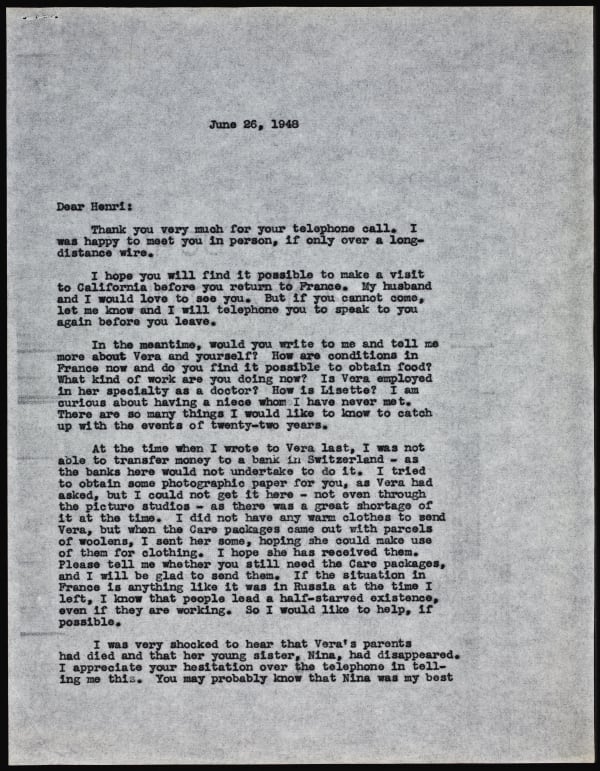
Henri Glarner was the husband of AR’s Russian cousin Vera (née Guzarchik). At the time of this letter, they were living in France.
[Page 1]
June 26, 1948
Dear Henri:
Thank you very much for your telephone call. I was happy to meet you in person, if only over a long-distance wire.
I hope you will find it possible to make a visit to California before you return to France. My husband and I would love to see you. But if you cannot come, let me know and I will telephone you to speak to you again before you leave.
In the meantime, would you write to me and tell me more about Vera and yourself? How are conditions in France now and do you find it possible to obtain food? What kind of work are you doing now? Is Vera employed in her specialty as a doctor? How is Lisette? I am curious about having a niece whom I have never met. There are so many things I would like to know to catch up with the events of twenty-two years.
At the time when I wrote to Vera last, I was not able to transfer money to a bank in Switzerland—as the banks here would not undertake to do it. I tried to obtain some photographic paper for you, as Vera had asked, but I could not get it here—not even through the picture studios—as there was a great shortage of it at the time. I did not have any warm clothes to send Vera, but when the Care packages came out with parcels of woolens, I sent her some, hoping she could make use of them for clothing.[*] I hope she has received them. Please tell me whether you still need the Care packages, and I will be glad to send them. If the situation in France is anything like it was in Russia at the time I left, I know that people lead a half-starved existence, even if they are working. So I would like to help, if possible.
I was very shocked to hear that Vera’s parents had died and that her young sister, Nina, had disappeared. I appreciate your hesitation over the telephone in telling me this. You may probably know that Nina was my best
[Page 2]
-2-
girl friend all through our childhood and college days. Would you tell me what it was that Vera has heard from Russia? Is there any hope of Nina being found or was she lost in the siege?
I have a great favor to ask of you. If Vera is in correspondence with her sister, would you ask her to inquire about the fate of my two sisters? I have heard through an old friend in Europe that both my parents have died, but I was not able to learn anything about my sisters. If Vera is able to inquire (if questions in letters are permitted, without embarrassing her sister) I would be very grateful if she would ask her sister about my family. And I would also like to know any news she has about any of our relatives and friends. But please warn her not to mention my name or anything about me, if and when she writes to Russia. I am quite famous here for my political views, so any connection with me may be dangerous or embarrassing to our relatives. If Vera has any news about my sisters, I would like to know it, even if the news is bad. But if the news is uncertain and her sister does not know for sure what happened, then I would rather not know it.
You may write to me in French. I understand it perfectly, but I find it difficult to speak, having had no occasion to speak French all these years. Please excuse my halting attempts at it over the telephone. I understood every word you said, but I could not think in French fast enough to answer you. Please thank your sister-in-law for her efficient translation.
With best regards from my husband and myself.
Sincerely,
*AR refers here to C.A.R.E. (Cooperative for American Remittances to Europe, Inc.), a post-World War II service through which Americans could send packages of food or textiles to friends or family in Europe.
AR eventually learned that her sister Natasha had died in a bombing raid and much later discovered that her younger sister, Nora, survived the war [Letters 570, 575 and 576]. And Nina appears to have taken her own life during the war, having—according to sister Tania—“no hopes for the future.”